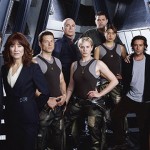 We get our first look at the way in which modern BSG sets itself apart immediately: the arrival of Six. She is a Cylon, but she looks human. Though I admit now when I see this, it reminds me of the “What the frak?” video where the narrator says “There are twelve Cylon models and some of them even look like models.” (the video has tons of spoilers for the series, but is very funny, if you haven’t seen it)
We get our first look at the way in which modern BSG sets itself apart immediately: the arrival of Six. She is a Cylon, but she looks human. Though I admit now when I see this, it reminds me of the “What the frak?” video where the narrator says “There are twelve Cylon models and some of them even look like models.” (the video has tons of spoilers for the series, but is very funny, if you haven’t seen it)
The first words spoken in the show sets our theme: “Are you alive?” This question is the reason I love the show so much: it is constantly asking what is life, what is death, what is the virtue of living versus mere survival, and how much of ourselves can we give up for survival and say we are still alive? Should we turn into razors, and if we do, can we get back?
Her curiosity has always been intriguing to me; it seemed more menacing before, but now in hindsight, it seems more childlike. She really doesn’t know what “life” is, and that’s how she and her people are prepared to wipe it out. It has no value to them. They have embraced the “we’re machines” propaganda of the Ones and only now, at the end, are they beginning to question it. We see it a bit later with Caprica Six as well, when she examines the baby. She knows the baby’s life will end later that day, and whether you subscribe to the theory that she was mercy-killing it in advance or made a mistake with its fragility, I think the importance of the scene is that the death troubles her. She’s learning to feel, and this is important for the Cylons, but also for the audience who already start to get an inkling that the Cylons are not mere toasters without emotions.
I liken the Cylons to children (and, in fact, given later revelations, they are the children of the Five), and, like children, they begin with an innocent cruelty and a selfishness that they are the only beings who matter in the universe. But as they bump against humans (Caprica loves Gaius, and she discovers she can have feelings for a stranger as well, in that infant and even the baby’s stricken mother), they discover they are not, in fact, the centers of the universe. Some of the Cylons develop into teenagers, with a teenage rebellion against authority, and then a maturity of their own in which they discover that another being has become more important than their own life. So, in a way, at least to me, this show is a coming of age tale — for the Cylons.